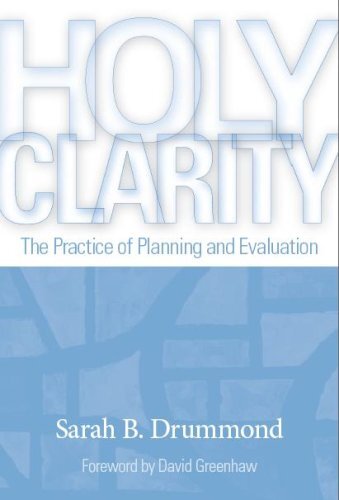Sarah B. Drummond, Holy Clarity: the Practice of Planning and Evaluation. Alban Institute. 2009.
Referenced in: Church Leadership Foundations, Church Dynamics, Research
LifeandLeadership.com Summary
Many ministers have had the experience of starting, or even finishing, a planning process, only to experience several layers of active or passive resistance. One of the chief reasons for this is that congregations have a multi-dimensional aversion to planning and evaluation. The preference for ambiguity in the postmodern ethos has made this even worse. This book serves as an excellent tool to help church leaders overcome their own internal resistance and equip them to create congregational readiness for the planning process. Drummond presents planning and evaluation as both organizational and spiritual disciplines.
I recommend this as part of a three-piece prequel to the planning process, alongside Wrenn’s Innovative Planning and Galindo’s Hidden Lives of Congregations. Planning, in some form and at some level, is necessary work, but it is also complex work. To do it well, and to experience lasting transformation from the ongoing process, one must know why planning is important with Holy Clarity, understand the nature of congregational systems with The Hidden Lives, and integrate all the pieces of the planning process with Innovative Planning.
From the Publisher
In Holy Clarity, Sarah Drummond explores the most basic reason leaders of religious organizations conduct evaluations: To find and create God-pleasing clarity regarding the organization’s purpose and the impact of its activities. Leadership and evaluation are not separate disciplines, she argues. Effective leaders evaluate because they need to know what is happening in their organizations and how those activities are effecting change.
Drummond first describes the way in which our postmodern culture makes clarity difficult to obtain. She then looks at holy clarity from a biblical and theological perspective and make the case that it is a spiritual discipline that can stand on its own theological merits. She presents four approaches to evaluation that can help a leader to guide a community toward greater clarity, both when evaluating or analyzing programs and when planning and starting programs. Finally, she considers the work of clarification as a faith practice, one that can make a pastor or layperson not just a better leader, but a better Christian who is more firmly grounded in God. Each chapter concludes with a fictional case study that provides a jumping-off point for discussion and helps bring her theory to life.
Holy Clarity provides an accessible resource as an entry point for those who are eager to learn the best practices of this crucial discipline.
About the Author
Sarah Birmingham Drummond is associate dean of the faculty and assistant professor of ministerial leadership at Andover Newton Theological School, where she directs the field education program and oversees the master of divinity curriculum. She is also an affiliated minister at Memorial Church at Harvard University and currently serves that congregation as its summer minister. She is an ordained minister in the United Church of Christ.
***For additional information on this resource, including reviews, click the bookstore links. Check the reference at page top or the links below for resource guides on related topics.***
See Other Resources on Church Leadership and Renewal:
- Church Leadership and Renewal, Index
- Church Leadership, Theological Foundations, Ecclesiology
- Church Leadership, Philosophical Foundations – e.g. Church Growth, Missional, Emergent, and Other Missionally Responsive Trajectories
- Church Leadership, Practical Foundations – Church Dynamics and Research
- Church Leadership, Practical Foundations – Congregational Culture, Church Identity
- Church Leadership, Practical Foundations – Size Dynamics, Size Transitions
- Church Leadership, Practical Foundations – Research and Case Studies on Effective Churches
- Church Leadership, Special Situations – Small Church Development
- Church Leadership, Strategies for Renewal
See Resources on Over 100 Areas of Ministry Leadership:


